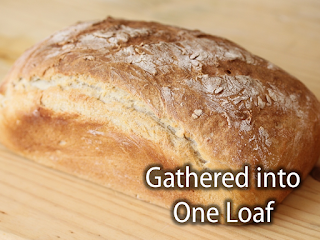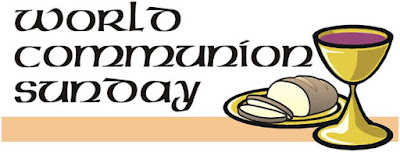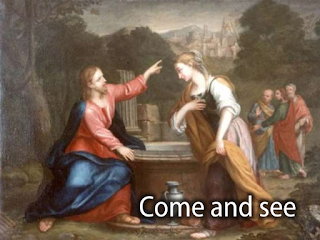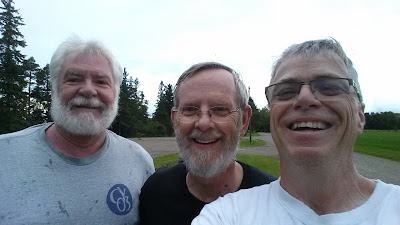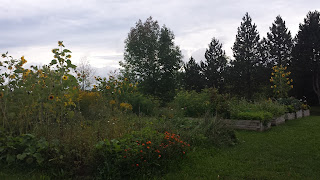Hespeler, 2 October, 2016 © Scott McAndless – World Communion
1 Corinthians 10:14-22, Luke 14:15-24 , Psalm 104:1-15
| Y |
ou are all familiar enough with the gospels and the letters and other writings that make up what we call the New Testament. This little collection of books is the most important source that we have for understanding the early Christians and how they worked out their life and faith together. This morning I would like to introduce you to one other document that you really ought to know about. It is called the Teaching of the Twelve and also goes by the name of The Didache, which is the Greek word for teaching.
The Didache is a very old document – some scholars think that parts of it may well be older than parts of the New Testament. It is also a very important document for a few reasons. It may well contain genuine traditions that go all the way back to the very words of Jesus – traditions that are independent of the gospels. It contains, for example, a version of the Lord’s Prayer that is slightly different from the one that is found in the Gospel of Matthew and from the one that is in the Gospel of Luke. It seems likely that the writers of the Didache did not get their version of The Lord’s Prayer from the Gospels but from an independent tradition passed down to them from some other source – ultimately from Jesus himself.
But the book actually gives us more than just insights into the original wording of Jesus’ prayer. It also gives us a glance into the worship practices of the early church. In fact, a great deal of the book is clearly focussed directly on the worship and other customs of a certain group of churches in a certain area. Most of the scholars I have read seem to believe that they were made up of second or third generation Christians in Galilee or in nearby Syria.
I find this fascinating because it gives us what is perhaps the very first glimpse we have (outside of the Bible and not influenced by any of the Biblical writings) of how the first church actually lived and worshipped. In other words, if you want to know what the earliest Christians actually thought they were accomplishing when they ate communion or performed a baptism, the Didache may be one of the very best sources that we have.
The Didache has, for example, a prayer of thanksgiving that was to be prayed whenever the community gathered to eat what we would call the Lord’s Supper or Communion or the Eucharist, but which they seemed to call simply the Thanksgiving Meal. As these prayers are probably the oldest communion prayers in existence (and they are nice and brief) I have decided to use them as our communion prayers this morning. I think they can teach us a lot about what they thought about communion that might challenge how we think about it today.
You see, when we gather to celebrate communion, there are certain things that we say about what we are doing and there are certain images that we use. We usually say, for example, that this meal is about the death of Jesus. In particular, we associate the bread with the broken body of Jesus and the wine with the spilt blood of Jesus. The imagery we often use is the imagery of a sacrifice or an atoning death. And we also look forward to the return, someday of Christ.
I don’t know how much you pay attention to the prayers that you have heard ministers like me praying before communion services but, if you do, those are the kinds of images that we you’ll hear us use over and over again because that is what we believe that communion is about – remembering and re-enacting those things.
But if you listen to the prayers that I use today from the Didache, you will not hear any of that imagery. The prayers of those ancient Galilean or Syrian Christians speak of Jesus Christ and talk about how he reveals God to us, of course, but they do not make any reference to his death at all. There is absolutely no talk of sacrifice or atonement nor even any reference to the return of Christ.
Now, I am not suggesting that the Christian churches of the Didache community did not believe these things about Jesus and his death. Of course they did and there are references in other parts of the book to these truths. And they may well even have believed that the Thanksgiving Feasts that they shared had important connections to the meaning of the death of Jesus (though there is some evidence to suggest that this particular connection may have first been made by the Apostle Paul). You certainly cannot prove that they didn’t believe something just because they didn’t mention it in this very important prayer.
But it does suggest something. It does suggest that, when they gathered to eat this meal, they did put the emphasis in some rather different places than where we put it when we gather. And maybe we can learn something from the imagery that they used when they ate this meal.
There were two prayers that they prayed. The first one was over the cup and they prayed, “We thank You, our Father, For the Holy Vine of David Your servant, Whom You made known to us through Your Servant Jesus; May the glory be Yours forever.” That was it. The prayer is based on the image of the making of wine itself which begins with the vine and the grapes that grow upon it. For the Didache Christians the wine (and the vine that it grew on) was a symbol of their connection with their hope. It connected them with the promises made to King David of a kingdom that would last forever – promises that they believed had been fulfilled in Jesus the Messiah and the son of David. That symbolism of the connecting vine is not one that we generally use when we take the cup but it is one that I think we might learn from.
But I am particularly interested today (on this World Communion Sunday) in the prayer that they prayed over the loaf: “We thank You, our Father, For the life and knowledge Which You made known to us through Your Servant Jesus; May the glory be Yours forever. As this broken bread was scattered over the mountains, And was gathered together to become one, So let Your Church be gathered together From the ends of the earth into Your kingdom; for the glory and power are Yours through Jesus Christ forever.”
For them, the bread seemed to point to two things. First of all, it spoke to them of everything that they had learned and seen in the life and teachings of Jesus. There is no direct reference to his death (which is where we put the emphasis) but rather the focus seems to be on his life.
The second focus of their prayer, however, is on an image – the image of the creation of the loaf itself. They notice that the loaf began its life spread over the mountains. This is actually one of the things that indicates to us that the Didache may have had its origins in Galilee. The best place to grow grain in Galilee was in the hill country and many of the hills were called mountains. So this prayer evokes the image of the grain growing on the mountaintops, being harvested and ground and then baked together into one loaf.
Why is this important? Because it suggests to us what it actually meant to these earliest Christians when they gathered and shared this kind of meal together. It was not primarily, for them, a feast of the dead and resurrected Christ. I mean, yes, they believed in the importance of the death of Jesus and the truth of his resurrection, but when they ate this meal that was not the first thing that came to mind. The image of the grain harvested from many hilltops and then baked into one loaf was, for them, what it all came down to.
It was a feast, first and foremost, of the unity of the church. I believe that that was at the very foundation of the feast. Even the Apostle Paul – who may have been the first one to make the connection between communion and the death of Christ – tells us that, before anything else, it is about our unity with one another. Since the authentic letters of Paul are actually the first written books of the New Testament (they were almost certainly written before any of the gospels), Paul was the first person to give us a written account of the Last Supper and to say what it meant. Yes, he said that he received that account from others who had told it to him, but he was the first one to set it down in a form that endured. So he was the one who first told us, in the eleventh chapter of the first letter to the Corinthians, that Jesus said that the meaning of the bread was, “This is my body that is for you. Do this in remembrance of me.”
But before Paul ever told us that, he told us in the tenth chapter of the same letter, “Because there is one bread, we who are many are one body, for we all partake of the one bread.”So even before Paul proclaimed that the bread was the body of Christ, he also declared that the loaf was the body of the church and that eating it together was a sign of our unity. He knew that the unity came first. The experience of the resurrection was the centrepiece of Christian faith, but Paul knew that he believers would never experience the power of the resurrection until they had found unity with one another.
What that means, my sisters and my brothers, is this: this feast is the feast of the resurrected Christ. When we eat this bread and drink this cup we do proclaim the death of Christ until he comes. It is also true that, when we eat and drink this sacred meal, the risen Jesus has promised to be present with us in it – truly present. But here is the problem: none of us can know that and none of us can experience that until we are united in one body as a church. Unity comes first.
So before this bread is broken like this body of Jesus was broken on the cross, you need to understand something about it. Before this bread becomes, for us, the body of Christ, it has to become the body of the church. You are the church – all of you. You make the church not because you are all the same but precisely because you are all so different.
We are those grains who start out spread far and wide over the mountaintops. We all sprouted where we were. We all grew into faith in our own way because of our unique circumstances and experiences. Some of you brought wounds and hurts into the life of the church. Some of you brought strengths and wonderful gifts. Most of us brought a mixture of both the positives and negatives. We came as we were and we remain as we are.
But though we started out in life spread far and wide over the hills and dales, we are all ground together into one bag of flour and then we have all been baked into one loaf. All of us come from different backgrounds and life experiences and here we have come together to be one. As you can imagine, that naturally leads to problems and clashes. We sometimes fail to understand one another because we are speaking out of our very different backgrounds and experiences and hurts. We sometime fail to appreciate one another because we are all so different. But we are only the church when we become that one loaf – when we finally realize that our differences make us stronger and tastier. The diversity among us makes this loaf delicious and full of good nutrients.
When we finally realize that and embrace one another despite being all so different, we are finally ready to experience the fullness of Christ among us. That kind of unity doesn’t come naturally to us. We often have to work at valuing people for who they are rather than for the things about them that are convenient to us. We often have to work at listening and truly hearing one another. The promise is that, when we do that, the presence of the risen Jesus will always be made clear.
That is what it means as we take this loaf, that was once spread far and wide over the mountaintops but has now come together as one loaf and is become the church. Only when we become that church, can the bread become the body of Christ who is present with us when we break it.
#140CharacterSermon When we take #communion, we become united, despite our differences, in 1 loaf so that 1 loaf can become Christ among us.
